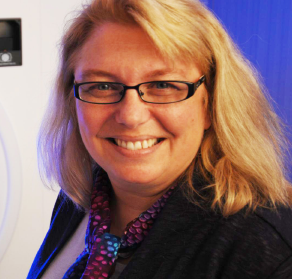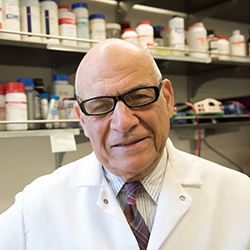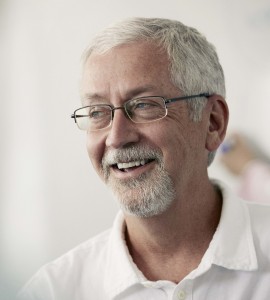Deanna Barch, a leading researcher on the role of cognition, emotion and brain function in illnesses such as schizophrenia and depression; and Timothy Ley, MD, an expert in cancer genomics and leukemia, will receive Washington University in St. Louis’ 2016 faculty achievement awards, Chancellor Mark S. Wrighton has announced.
Irving Boime, a professor of developmental biology and of obstetrics and gynecology in the School of Medicine, also will receive the Chancellor’s Award for Innovation and Entrepreneurship. This award goes to a faculty member selected by the chancellor for special and significant contributions in innovation and entrepreneurship.
Barch, chair of the Department of Psychological & Brain Sciences in Arts & Sciences and the Gregory B. Couch Professor of Psychiatry in the School of Medicine, will receive the Arthur Holly Compton Faculty Achievement Award.
Ley, the Lewis T. and Rosalind B. Apple Professor of Medicine and chief of the Section of Stem Cell Biology in the Division of Oncology, will receive the Carl and Gerty Cori Faculty Achievement Award.
“These faculty achievement awards are intended to build bridges between the Danforth Campus and our School of Medicine Campus,” Wrighton said. “As distinguished scholars and as members of the Washington University faculty, professors Barch and Ley embody the ideals of individual and collaborative excellence. Their work has done much to strengthen interdisciplinary scholarship among our campuses. I am extremely pleased to recognize their achievements with these awards. These awards are very significant because faculty peers select the honorees from a group of nominees from the faculty.”
Barch, Boime and Ley will be recognized at an awards ceremony Oct. 14. Barch and Ley also will make presentations on their scholarly work at the ceremony.
Deanna Barch

Barch’s research focuses on determining the cognitive, emotional and neural bases of risk for the development of serious mood disorders and other mental illnesses such as schizophrenia and substance dependence.
Working with students pursuing integrated training in psychology, neuroscience and biomedical engineering, she directs a multidisciplinary approach to the study of psychiatric disorders.
Her graduate students have recognized her commitment to teaching with two Outstanding Faculty Mentor awards. Other honors include the Distinguished Scientific Award for Early Career Contribution to Psychology in the area of psychopathology from the American Psychological Association. In 2005, she was awarded a fellowship at the Clare Hall Center for Advanced Studies at Cambridge University.
Barch earned a bachelor’s degree in psychology from Northwestern University in 1987 and a master’s degree and doctorate in clinical psychology from the University of Illinois at Urbana-Champaign. After earning a doctorate, Barch joined the faculty of Western Psychiatric Institute and Clinic at the University of Pittsburgh medical school, where she served a one-year internship and a three-year postdoctoral fellowship.
She taught psychiatry for a year before joining Washington University as an assistant professor of psychology and as co-director of the Cognitive Control and Psychopathology Laboratory. She became an associate professor of psychology, of psychiatry and of radiology in 2003, and a full professor in 2008.
Also in 2008, she became director of the Conte Center for the Neuroscience of Mental Disorders at the School of Medicine.
The author of more than 260 publications, Barch has served as editor-in-chief of Cognitive, Affective and Behavioral Neuroscience. She is currently deputy editor at Biological Psychiatry and is on the editorial boards of Schizophrenia Bulletin, Journal of Abnormal Psychology, and Clinical Psychological Science. She is a member of the National Institute of Mental Health (NIMH) Scientific Council and is on the Brain and Behavior Research Foundation’s Scientific Council.
Her research has been funded by the NIMH, the National Science Foundation, the Brain & Behavior Research Foundation, the Dana Foundation and the McDonnell Center for Systems Neuroscience.
She is the recipient of several additional awards, including the American Psychological Association’s Distinguished Scientific Award for Early Career Contribution to Psychology in the area of psychopathology, and the Joseph Zubin Memorial Fund Award. She is a fellow of the Association for Psychological Science and a member of the American College of Neuropsychopharmacology.
Irving Boime

Boime’s research has focused on numerous investigations of the structure and function of pituitary and placenta hormones. His work has resulted in new therapeutics to treat human infertility and growth disorders, as well as support animal husbandry in agriculture. The technology he and his team developed increases the amount of time key hormones remain stable in the bloodstream. Working with Washington University’s Office of Technology Management, these patents have been licensed by several companies, including OPKO Health, Merck and Pfizer.
To treat infertility, many women must undergo at least a week of daily injections of follicle-stimulating hormone (FSH), a protein that causes ovaries to prepare eggs for ovulation. With Boime’s modified version of FSH that extends its stability in blood, a week’s worth of daily shots is reduced to a single injection. The modified FSH treatment, Elonva, is available to patients in Europe, South America, Asia and the Middle East.
A similar increased lifespan in the circulation is seen when the same modification is made on other hormones, including human growth hormone, which is currently in clinical trials for adults and children with growth hormone deficiency. The technology also is being investigated for use in hemophilia, extending the lifespan of specialized proteins these patients need to help their blood clot.
Boime earned a bachelor’s degree from the St. Louis College of Pharmacy and a master’s degree from Purdue University. He returned to St. Louis to enter the doctoral program at Washington University School of Medicine, where he earned a doctoral degree in 1970. After two years of postdoctoral training at the National Institutes of Health (NIH) as an American Cancer Society fellow, he joined the School of Medicine faculty as an assistant professor of pharmacology and of obstetrics and gynecology in 1972.
A full professor since 1981, Boime has authored more than 170 peer-reviewed publications and holds 27 patents. He has served on editorial boards for numerous scientific journals, including Molecular Endocrinology, Endocrinology, Placenta and the Journal of Biological Chemistry. He has served as associate editor of the journal Endocrinology and has received the Research Career Development Award from the U.S. Public Health Service.
Timothy J. Ley

Ley’s pioneering research in cancer genomics has laid the groundwork for precision medicine in cancer, which targets treatment to a patient based on the genetic makeup of a tumor and how it responds to therapy.
In 2008, he led a team of researchers at The McDonnell Genome Institute that decoded the entire genome of a cancer patient’s tumor. It was the first time scientists compared the DNA in a patient’s healthy and malignant cells to find genetic mutations that likely caused the disease.
Last year, President Barack Obama named Ley to the National Cancer Advisory Board, which advises the U.S. Secretary of Health and Human Services, the director of the National Cancer Institute (NCI) and the president on the nation’s cancer program and reviews proposals awarded by the NCI. His term lasts until 2020.
Ley also is associate director for cancer genomics at The McDonnell Genome Institute and a research member at Siteman Cancer Center at Barnes-Jewish Hospital and Washington University School of Medicine.
He currently holds $1.7 million in annual grants from the NCI and has authored nearly 200 publications. Ley has served on the boards of many medical and research organizations, including the National Human Genome Research Institute Board of Scientific Counselors, the Federation of American Societies for Experimental Biology Board of Directors, and the councils of the American Society for Clinical Investigation and the Association of American Physicians.
Ley is an elected member of the National Academy of Medicine and of the American Academy of Arts & Sciences. He also is a past president of the American Society for Clinical Investigation and was chair of the Board of Scientific Counselors for the National Human Genome Research Institute.
Ley earned his bachelor’s degree from Drake University in 1974 and his medical degree from Washington University in 1978. He is board-certified in internal medicine and hematology. He joined the School of Medicine faculty in 1986 as an assistant professor of medicine after being a senior investigator for two years at the National Heart, Lung, and Blood Institute, part of the National Institutes of Health (NIH) in Bethesda, Md.
He has received numerous honors and awards, including the Erasmus Hematology Prize from Erasmus University in Rotterdam, Netherlands; NCI’s Alfred G. Knudson Award for Cancer Genetics, the American Society of Hematology’s E. Donnall Thomas Prize and its Mentor Award, and Washington University’s Second Century Award, which recognizes individuals whose long-term commitment and participation have enabled the School of Medicine to look to the future with strength and confidence.